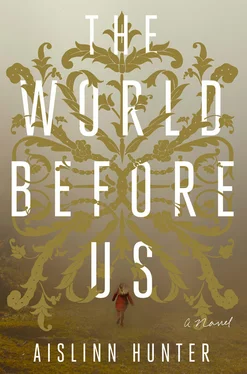Leeson let out a whoop that rounded out into the woods so joyfully he almost didn’t believe it had come from him. He glanced up at Herschel’s broad back and stooped shoulders, then back at the rosy face of the girl. It didn’t matter that they ignored him; his mind was racing, so much so that he failed to notice they’d come to a worn path bordered by pollarded oaks. He looked at the oak closest to him and it wavered, became one of the trees that bracketed the park in his city, the park where he’d sometimes gone for midday walks, watched the brown backs of the ducks shining as they waddled out of the pond.
Up ahead Herschel trudged on, his boot heels clomping down with every step, mud from the last ravine they’d crossed spackled across the backs of his legs. Leeson wanted to call out to him but didn’t, wanted to ask if the farmer could see the same apparition that he was seeing: a bench in a clearing, a high gate with curled finials and a woman with a parasol walking through it.
An hour or more passed and the trees overhead became fuller, knitted themselves into rafters, growing as dark and sooty as a ceiling. Leeson’s stomach grumbled and instinctively he reached a hand toward his pocket watch to check the time, only to discover that he was wearing a plain shirt and no waistcoat. The sky had become so dusky it was difficult to keep to the path, to squint past the trunks of the trees for the dining room table, blue-medallion wallpaper and brass lamps he expected to appear in the thicket. His right foot struck a root, sending him onto his hands and knees. It was only then, as he found his feet and brushed himself off, that he recalled he was in the country, near the Whitmore Hospital for Convalescent Lunatics, and remembered how he came to be there.
By the time Herschel stumbled out of the grove and happened upon the estate house, the sky had gone the blue-black of a rook — a bird that he preferred over jackdaws or magpies, not just for its shag feathers, but for the kaarg call it made when roosting at dusk, a throatier, more satisfying sound than the pruc-pruc of the raven. On the walk so far he had counted eleven different birdcalls, though in some cases he had not seen the bird, which he knew Dr. Thorpe would say left open the possibility that, like certain human voices, those birdsongs might be constructed — be things one wants to hear. But the country house, Herschel decided, was not imagined. From the end of its great lawn he could make out the protrusion of an arcaded portico and two storeys of darkened windows that flanked off in either direction. The house sat mutely save for one slit-eye casting lamplight between its heavy curtains and tufts of smoke drifting out of the chimneys. Instinctively Herschel ran through a list of the kinds of nests one might find up there, bird names flitting through his head like a host of sparrows. He was fond of roofs, had been known to set his body down on ledges, window peaks or near chimney stacks — good spots to rest after hours of flapping along.
When Leeson and the girl caught up to him, they too took in the house hunkered in the distance. From the edge of the lawn it appeared as if some large and ornate stone had been dropped from the sky into an impossibly manicured setting. The scent of burning wood in the air lent itself to the idea of warmth, a place to sit down, something to drink — tea perhaps, or a cup of water.
Leeson turned to Herschel and swung out his arm as if clearing the way of obstructions, and the farmer’s round face filled with delight, though he didn’t move. In the end it was Leeson who rapped the lion’s-head door knocker against its plate, adjusting his cuffs while he listened over the chirr of crickets for the sound of footsteps. A minute later the door opened and a young footman with a centre part and a thin moustache appeared; he cleared his throat and moved his neck from side to side as if just settling into his collar.
“May I help you, sir?”
Leeson recognized the man’s enunciation; it was the kind developed through practice. In better days he had heard the same forced diction from a variety of servants employed in the houses he visited for work. “Yes, you may,” he replied. He brought his heels together in an effort to stand taller. “Is the Master of the estate at home?”
The footman furrowed his brow and peered over Leeson’s shoulder at the others. “Might I ask who is calling?”
“Indeed.” Leeson smiled back at his companions, fighting the urge to explain Herschel’s lack of trousers or to flatten his own hair where the grey bits always stuck out from the brown. He turned again to the footman. Behind him he could make out a columned entry hall, a modest candle chandelier, a thick Turkish rug and a mahogany table set against the back wall holding five or six leather-bound volumes stacked on their sides. He caught a glimpse of a large mounted bear, its open maw and the spread of its brown claws, before he shifted his gaze back to the books. There was a time in his life when he’d spent whole days poring over tomes such as these, some of them half the size of his desk, all of them embossed and bound in similarly dyed leathers.
“Sir?”
Leeson sighed. It wouldn’t serve any purpose to be a probate solicitor here, but the footman expected something. He glanced over the footman’s shoulder again, wishing a glass of claret might appear to relieve him of his thirst. “Please say that Mr. Charles Leeson is calling.”
“Mr. Leeson, is it?”
“Yes, and company—” He gestured vaguely behind him.
“And might I tell Mr. Farrington your business?”
“You may. I am here regarding a bequest.”
The footman furrowed his brow again, an expression that had annoyed Leeson the first time.
“Yes, a bequest ,” Leeson repeated, savouring the shape of the word in his mouth, “of books. I regret I do not have my card.” He patted down the front of his shirt as if it might sprout a pocket.
“Books?” the footman repeated somewhat dubiously.
“Yes. I am here in my capacity as—” and here he paused, considered a variety of overtures, and then said “—the Assistant Librarian of the British Museum,” hastening to add, lest the footman turn them away, “London.”
In the end they stayed only briefly. George Farrington allowed his visitors to rest in the small parlour while he sent the maid for refreshments. Herschel plopped himself down on the horsehair sofa, which meant that Leeson had to take the wingback that was situated farther away from the fire. The room was full of the sound of ticking clocks: a pillared carriage clock on the mantel, an ornate brass skeleton model with an ebony face on the tallest of the bookshelves and an old mahogany longcase on the opposite wall wedged between a stuffed grouse and a mounted fox. Two of the clocks were out of sync, so that every second had two beats, the confidently announced tick of the larger clock’s brass hand followed by a faint echo from the bookshelf. Farrington did not seem to notice. His hospitality extended to a series of questions: Which way had they come to Inglewood? Were they expected elsewhere? And, less pointedly, what particular flora or fauna might they have noted on the way? These questions were followed by a brief declamation on the state of the surrounding countryside, after which the maid intervened with tea. It arrived on a gleaming silver platter that she set down on a table with claw feet carved so realistically that Leeson believed they were gripping the rug. George Farrington’s mother, Prudence, joined them shortly thereafter, though she stopped upon entering the room, a strained expression on her long face as if she had suddenly come into contact with music she didn’t care for. It was only when George greeted her with a warm “Mother” that her beauty became apparent: the thin petals of her mouth relaxing into a pleasing fullness, her chin lifting to reveal the elegant length of her neck. She extended her hands and moved toward her son, and the pleated hemline of her mauve dinner dress shushed over the carpets behind her. Leeson bowed deeply as she approached, but Herschel remained seated, his head cocked to study the intricately fastened brown nest of her hair.
Читать дальше












